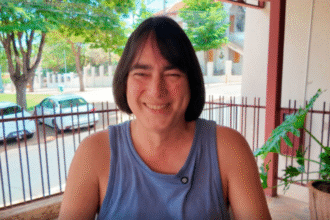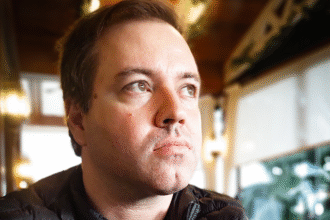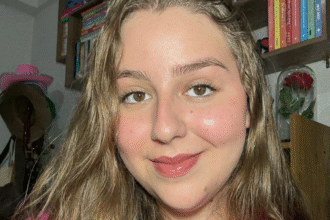In a world of meticulously chosen words and passions intertwined with nature, emerges the captivating figure of the renowned Polish author, Paulina Kuzawińska. With her introverted determination and an intrinsic connection to natural beauty, Kuzawińska finds in writing her tool to transcend to past eras and breathe life into unique worlds on paper.
An Aries by zodiac sign and marked with the number nine in numerology, she reveals herself as an old soul in search of puzzles, secrets, and emotions. In this deep dive into her carefully chosen words, we discover not only a writer but a storyteller who weaves magic with the simplicity of letters.
Kuzawińska invites us to explore her universe, where old books, 90s cartoons, and Hitchcock films intertwine in a unique tapestry of inspiration. Prepare for a literary journey guided by the creative mind and singular passion of this author, whose words echo like an invitation to unravel the extraordinary amidst the ordinary.
His passion for writing and the influence of words in creating fictional worlds are notable elements in his works. How do you incorporate this unique ability to bring past eras to life in your narratives?
Bringing past eras to life in narratives is a fascinating challenge for me as a writer. I enjoy challenges, and perhaps that’s why the past, from an author’s perspective, seems more interesting to me than the present – a novel set in the past allows us to discover a world that no longer exists. When writing, I try to immerse myself in the realities of the era, not only by reproducing the historical background, but also by empathizing with the way people thought at that time and their customs. Language is an important tool for me – I strive to make it somewhat lyrical, sprinkled with an archaic note, yet clear and understandable for the contemporary reader.
I love it when a story becomes a kind of time machine, transporting the reader to distant eras. I aim to provide similar experiences in my books, allowing readers to momentarily transport themselves to different times and places. My goal is to create a story that is both true to historical realities and engaging, full of emotions and human experiences that are timeless.
The search for truth and hidden mysteries seem to be recurring themes in your books. How do you develop these elements in your stories, especially the relationship between past secrets and unexpected twists?
I believe that a well-told story always harbors some mystery, and it’s the mystery that attracts readers to the story, maintains their interest, and provides suspense in anticipation of its resolution. Secrets from the past are valuable tools for a writer, as they undeniably influence the present. In my stories, uncovering these mysteries helps the characters better understand their current situation. I think that the pursuit of understanding reality is an innate psychological need of humans, which is why such stories intrigue. I must admit that when I plan a novel, I usually start with a mystery. The mystery often forms the axis around which I build the plot.
In “Żona alchemika”, “Dama z wahadełkiem”, “Dama ze szmaragdami” and “Dama z woalką”, we notice the presence of strong female protagonists. How important are these characters in your narratives and how do you develop them throughout the plots?
Female characters often play a key role in my narration, although I also enjoy creating male protagonists, such as Father Flynn from my latest novel “Czarownica”. Just like real people, book characters develop and transform when they step out of their comfort zone and face various challenges. As an author, I often create situations that thrust the character out of their safe space and force them to confront difficulties. It is through these challenges and trials that characters evolve and gain depth.
In past eras, where my novels are set, women often had limited tools and opportunities to make decisions about their lives. For this reason, my heroines often have to demonstrate greater determination and courage to overcome obstacles and achieve their goals. An example can be the character of Weronika from “Żona alchemika”, who, despite the limitations of the era, bravely follows her convictions and strives to realize her own goals and ambitions.
Your books delve into sensational, retro-style intrigue, with romantic threads and mysterious crimes. How do you balance these different elements to create a captivating and engaging atmosphere?
The atmosphere of a novel is very important to me. I believe that it significantly allows the reader to mentally transport themselves to a specific place and time, while also influencing their emotions. The atmosphere acts as a catalyst for the imagination, making even the most improbable scenarios seem possible. I have a fondness for Victorian-style stories, where romance and a certain kind of horror intertwine. Combining these elements is somewhat like walking a tightrope for me – I rely primarily on my intuition. When I create, I try to listen to my own emotions and reactions to the scenes I write.
In “Cienie Paryża”, you transport readers to Paris in 1889, during the World Exhibition. How do you research and recreate these historical environments authentically while introducing elements of romantic horror?
When writing “Cienie Paryża”, I endeavored to capture the realities of Paris in 1889, during the famous World Exhibition. My knowledge of French allowed me direct access to original texts and drawings from that era, available in French online libraries. This enabled me to immerse myself deeper into that period and better understand its realities.
I think the challenge in writing a novel with a historical background lies in selecting those background elements that will be most interesting and relevant to the story, without overwhelming the reader with an excess of historical facts. Even if certain historical details seemed fascinating to me, I had to limit them and choose only those that best serve the story, enriching it without hindering the pace of the narrative. I hope I have succeeded in this.

The magical and intriguing universe of “Zaklęcie na wiatr” suggests a fascinating journey. How do you develop the mythology and magical elements within the story and how do these elements contribute to the development of the characters?
In the novel “Zaklęcie na wiatr”, developing mythology and magical elements was both a fantastic fun and a challenge for me. Similar to creating novels with a historical background, writing fantasy requires enlivening the imagination and using it to create a world that currently does not exist. This is what connects these two genres and is one of the aspects of writing that brings me the most joy: creating a reality that comes to life through the power of imagination and shows something different from our here and now.
I believe that when writing fantasy, it is particularly important to pay attention to the consistency of the world presented. For me, it’s important that the magic in my stories, like the laws of physics in the real world, adheres to generally accepted principles. This means that the magical elements not only provide certain possibilities for my characters but also impose limitations on them, which they must confront.
Your works seem to be a deep dive into themes such as love, tragedy, mystery and revenge. How do you balance these intense emotions while keeping the narrative flowing cohesively?
Exploring intense emotions in stories requires listening to one’s own reactions and intuition. As is known, emotions are felt not only by the mind but primarily by the body – fear accelerates the heartbeat, joy brings a feeling of lightness, and sadness causes tears to flow from our eyes. When describing the feelings of characters, I often refer to these physical reactions to emotions. In today’s world, where intense emotions are present everywhere – in the media, movies, politics – readers seem to be accustomed to strong emotional experiences. On the other hand, I try to ensure that reading my novels leaves the reader with a sense of satisfaction and, despite everything, brings them pleasure, even if the book tackles dark and sad topics – as does my latest novel “Czarownica”,which is set in Ireland after the period of the Gre.at Famine.
Some of your books incorporate historical elements and real figures as part of the plot. How do you research and integrate these historical events and characters to create an authentic and immersive experience for readers?
When incorporating historical events and figures into my books, I am primarily guided by a deep immersion in the era I am describing. I try to use access to sources that will enable me to do this, as I did in the case of “Cienie Paryża”. It is important for me to select those historical elements that will be most significant for the plot, while also ensuring not to overwhelm the reader with an excess of information. I strive to make the historical aspects harmoniously interact with the fictional elements of the story, creating a cohesive narrative.
You mentioned your love of old books, 90s cartoons, and Hitchcock movies. How are these influences reflected in your writing style and the construction of the narratives in your books?
I absolutely adore the work of Hitchcock. The suspense, unease, and unexpected solutions in Hitchcock’s works, as well as the dark corners of the human psyche that he explores, are elements that continually intrigue me. Meanwhile, cartoons from the 90s and a love for old books are part of my childhood, just like writing novels, which is for me the fulfillment of childhood dreams. Although I am not sure to what extent all these elements directly influence my writing style, they certainly provide me with immense inspiration
How does your Aries sign and identification with the number nine influence or manifest itself in your stories and the way you approach creating complex characters and intriguing plots?
I am interested in astrology and numerology. Even though some may approach these fields with skepticism, I find them to be very intriguing tools for a writer. Both the zodiac and numerological numbers serve as a kind of archetype mine for me, each possessing both light and dark sides. Every zodiac sign is characterized by a unique set of traits, weaknesses, and exceptional qualities, such as various elements. Learning and trying to understand these archetypes helps in creating characters that are multidimensional, full of life, and convincing. I believe that archetypes expressed in the zodiac, numerology, and tarot symbolically illustrate the diverse aspects of human experience that we all seek in a good story.
Regarding my sun sign in astrology, Aries, it is often associated with fiery energy, courage, and determination – I quickly get excited about new ideas and immediately want to implement them. Meanwhile, the number nine in numerology is often linked with creativity, empathy, and a deep understanding of human nature. Nine signifies an old soul, and I think it really fits me. It might also explain my fondness for past epochs and introversion – after all, it corresponds to the Hermit archetype.
Follow Paulina Kuzawińska on Instagram





